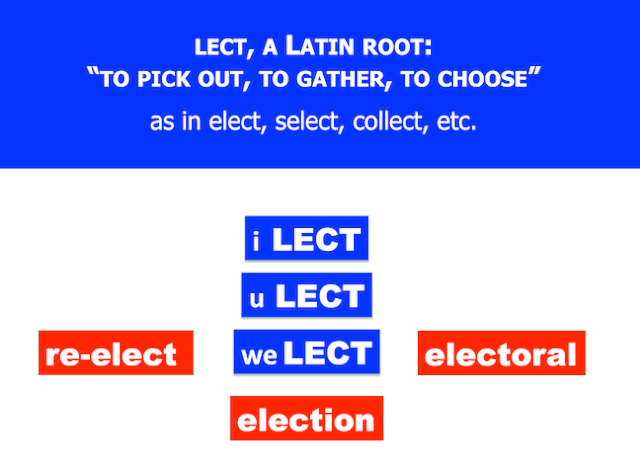Just a reminder to go out and vote, and a few words about the Latin root LECT as in elect, electing, elected, election, electives, and the related words select, collect, dialect, etc.
Also, TED TALKS offers various perspectives on this election. See The Issues at Stake in the US Election of 2016.
Now for affixes and roots. This graphic is just something I put together for fun, but hopefully it gets the point across. I expect there's plenty of creative expression going on in schools this week!
The prefix e- is an assimilated form of the well-known prefix ex-, meaning 'out, from' We see it also in erase, emerge, evaporate, etc. So to elect is to 'choose from a group or pick out' or something of that sense. Harper's Online Etymology Dictionary is free to all. He describes the origins of election below. Notice the religious sense and the reading sense:
election (n.) c. 1300, "act of choosing someone to occupy a position, elevation to office" (whether by one person or a body of electors); also "the holding of a vote by a body of electors; the time and place of such a vote," from Anglo-French eleccioun, Old French elecion "choice, election, selection" (12c.), from Latin electionem (nominative electio), noun of action from past participle stem of eligere "pick out, select," from ex- "out" (see ex-) + -ligere, comb. form of legere "to choose, read" (see lecture (n.)). Theological sense "God's choice of someone" for eternal life is from late 14c. Meaning "act of choosing, choice" is from c. 1400.
Above is a more exhaustive look at the root LECT along with various forms and interpretations, with oodles of relevant words. The screenshot is copied from Robertson's Word Info. Click on the link for MUCH more info. I cannot begin to imagine how long it took him to create this amazing reference tool. Notice that Robertson mentions the relationship between Latin and Greek. The Romans borrowed from the Greeks, so this is not surprising.
And...
Let's not forget the fun historical word snollygoster! I mentioned this before, but it's worth another look. Etymologist Mark Forsyth adds some humor to to the intensity of this election. If the video doesn't play, go directly to the TED page.
And...
Let's not forget the fun historical word snollygoster! I mentioned this before, but it's worth another look. Etymologist Mark Forsyth adds some humor to to the intensity of this election. If the video doesn't play, go directly to the TED page.

